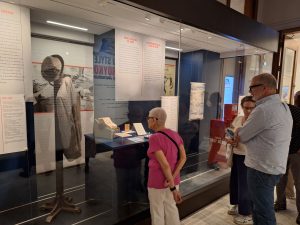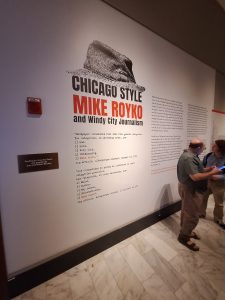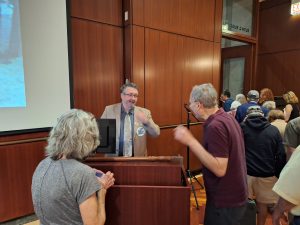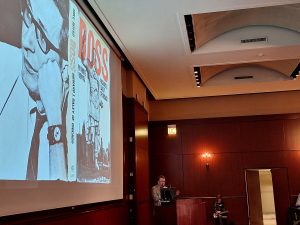Newberry exhibit remembers Royko’s prose, power
By Kevin Beese Staff Writer — September 4, 2024
Visitors at Chicago’s Newberry Library check out items in an exhibit on longtime Chicago columnist Mike Royko. (Photo by Kevin Beese/Chronicle Media)
Beloved Chicago columnist Mike Royko and power broker Chicago Mayor Richard J. Daley grew up in similar environments.
Royko was born in 1932 in a Polish-American neighborhood on Milwaukee Avenue on Chicago’s North Side. Daley was born 30 years earlier in the equally white Bridgeport neighborhood on the city’s South Side.
Daley despised individuals who were different, noted Bill Savage, Northwestern University professor on instruction in English, while Royko embraced them.
“Royko is somebody you want to read to see the bright side of that ethnic Chicago culture that was so evident,” Savage said.
The Northwestern professor said Royko was visionary with the words he put in print.
“He was so far ahead with his writing,” Savage said during a program Thursday at Chicago’s Newberry Library looking at Royko, Daley and the 1968 Democratic Convention. “He was so much on the side of the civil rights demonstrators.”

Part of the Newberry’s exhibit includes a quote from Albuquerque Journal columnist Jim Arnholz listing columnists in ascending order: “1. Bad. 2. Good. 3. Very Good. 4. Outstanding. 5. Mike Royko.” (Photo by Kevin Beese/Chronicle Media)
Savage said Royko was insightful about Chicago politics and history. He noted in one column Royko masterfully writes about what readers assume is police action during ’60s civil disobedience only to be told it was police actions in the 1855 Lager Beer Riots against Germans and Irish, the first major civil disturbance in the city.
“I tell this story for the benefit of those who keep wondering what this world is coming to when minority groups start marching in the street to protest discrimination,” Savage quoted from Royko’s column.
“So, here’s Royko reaching back into what for most Chicagoans is unknown, ancient city history and showing that the pattern and structure of this kind of protest is still with us and has been with us for a very long time.”
Savage helped curate an exhibit currently at the Newberry Library that remembers the columnist’s impact on not just Chicago journalism, but the nation.
Sarah Boyd Alvarez and Kristen Emery are co-curators of the exhibit that includes a commemorative printing plate from the last issue of the Chicago Daily News, which has a front-page article by Royko, and personal items from Royko’s Chicago Tribune office, including his tweed blazer and a crushed pack of Carlton 100 cigarettes with six cigarettes still in the pack.
Royko worked for the Chicago Daily News from 1959-78, the Chicago Sun-Times from 1978-84, and the Chicago Tribune from 1984-97.
His first column was on the loss of the neighborhood tavern, which appeared in the Daily News on Sept. 6, 1963. His last column was on why the Cubs never succeed, which appeared in the Tribune on March 21, 1997, just more than a month before he died.
In between, he wrote more than 7,500 columns, touching the hearts, brains and funny bones of Chicago, suburban and national readers.
Alvarez noted the Royko exhibit was originally slated to run a few years ago, but the COVID-19 pandemic sidelined the event. She said having it now seems right.

Northwestern professor Bill Savage talks with audience members after his Thursday presentation at the Newberry on Royko, Richard J. Daley, and the 1968 Democratic National Convention. Savage is also co-curator of the Royko exhibit at The Newberry. (Photo by Kevin Beese/Chronicle Media)
“This is a time when we have an election coming up and it’s so important that we have trusted sources for news,” Alvarez said. “I think something like this shows people to think about what they are hearing and reading. It helps them do critical analysis. News sources can be controlling and confusing. People need to think about what news sources they trust.
“Some writers like Mike Royko, their work still resonates to this day.”
Alvarez said that through July, nearly 4,600 people had viewed the Newberry’s Royko exhibit. She hoped that 10,000 visitors will have seen the exhibit by the time it closes in late September.
Co-curator Kristen Emery noted that some Royko items, such as FBI files on the columnist having a stalker and “another curmudgeon” urging the federal agency to look into Royko’s actions, are part of the Newberry’s materials, but not part of the exhibit, primarily because neither complaint amounted to anything.
Emery said the exhibit can be of interest to individuals too young to remember Royko’s writings or even know who he was.

Savage addresses the audience while displaying a picture of Royko and his book, Boss, about Chicago Mayor Richard J. Daley. The book continues to be printed more than 50 years after being written. (Photo by Kevin Beese/Chronicle Media)
“This particular collection allowed us to look at him through a professional lens, which is exactly what we wanted to do, and really think about the impact that he had on journalism in Chicago and beyond,” Emery said, “and this period of journalism which was so dynamic from the ’50s through the end of the century when he was working.”
Alvarez said the exhibit weaves in the changing media landscape of the 20th century.
Emery noted that in the 27 years since Royko’s last column, newspaper subscriptions have declined, and cable television news and social media have arisen.
“We’re trying to do a little juxta positioning of what was the world like when fewer people had a platform versus now where it’s so much more dispersed,” she said
“Nobody was thinking about Youtubers in the 1950s and ’60s when (Royko) was starting,” Alvarez said.
The exhibit looks at Royko, even though a Pulitzer Prize-winning columnist, as a man of the people — the organizer of Rib-Off, which became the largest rib competition in the country; having a Penny-Pitching Contest in the parking lot of the Daily News; and his love of 16-inch softball.
The exhibit includes a look at Chicago Mayor Richard J. Daley’s clashes with Royko, including Royko’s book about Daley, “Boss”, mysteriously being removed from the shelves of National Tea Co. stores (the precursor to Jewel) and bookstores at Chicago’s two airports.
A tablet is provided in the exhibit for guests to read Royko columns in their entirety. Books with Royko’s columns are also available to peruse, as is a copy of his book, “Boss”.
Alvarez noted that the Royko exhibit carries on the Newberry’s theme this year centering on Chicago.
Earlier this year, the library had an exhibit on legendary Rush Steet nightclub Mr. Kelly’s. Exhibits still to come are one on Indigenous Chicago and one on immigrants in the Chicago printing industry.
“All the shows that are opening in 2024 are about Chicago,” Alvarez said. “We want to remind people we have a diverse city with a rich history.”
“Mike Royko and Windy City Journalism” runs through Sept. 28 at the Newberry Library, 60 W. Walton St., Chicago. Admission is free. The library is open from 10 a.m. to 4 p.m. daily, except Sundays.







